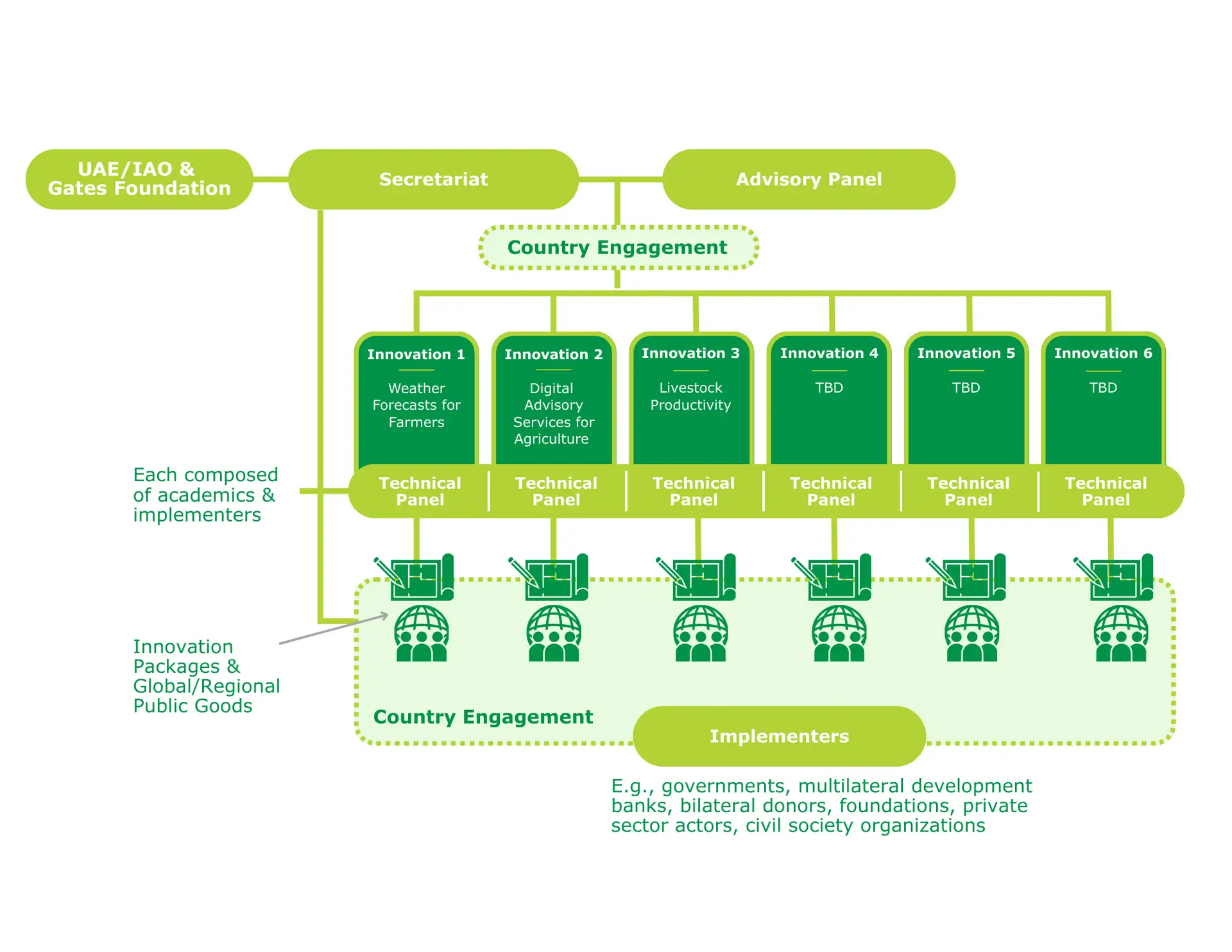About Us
Agriculture is central to economies and livelihoods around the world, particularly in low- and middle-income countries (LMICs), but it faces growing challenges that threaten productivity and food security.
Multiple evidence-based innovations could help improve farmer outcomes but new mechanisms are needed to take these solutions to scale in LMICs.
The Agricultural Innovation Mechanism for Scale (AIM for Scale) develops customized Innovation Packages and secures partnerships and funding to deliver cost-effective innovations to hundreds of millions of farmers.

Background
AIM for Scale was announced at COP28 by the United Arab Emirates and the Gates Foundation, with a mission to accelerate the adoption of rigorously tested solutions that improve farmer livelihoods and strengthen food systems. The initiative builds on years of UAE leadership in food systems innovation through the Agriculture Innovation Mission for Climate (AIM for Climate)—a joint effort with the United States. AIM for Scale draws on lessons from both AIM for Climate and the Innovation Commission for Climate Change, Food Security, and Agriculture, a global commission backed by the Gates Foundation and chaired by Nobel Laureate in Economics and Chair of our Advisory Panel, Michael Kremer.

The partnership will focus on agriculture research and development, and scaling up innovations, which is so desperately needed to adapt food systems to the growing threats of climate change.
Her Excellency Mariam bint Mohammed Almheiri,
Chair of International Affairs Office
Presidential Court of the United Arab Emirates
Of course we don’t just want these improvements to be in the lab, we want them to scale up.
Bill Gates,
Founder of the Gates Foundation

The Challenges
01
Interlinked Crises of Climate Change, Food Security, and Agriculture
Agriculture is a major driver of climate change and is also highly affected by it, threatening livelihoods and food security. Agriculture and food systems generate roughly a quarter to a third of global greenhouse gas (GHG) emissions. While most GHGs are produced in high-income countries, their adverse effects are felt disproportionately in lower-income countries. Small-scale producers are among those most vulnerable to climate risks. In 2023, some 864 million people experienced severe food insecurity, an increase of over 300 million from 2014.
02
The Need
for Scalable
Innovations
Our Process
AIM for Scale’s primary instrument is the Innovation Package—a structured investment blueprint focused on a single high-potential innovation area. Each package identifies the full set of conditions required for scale, including technical design, financing mechanisms, delivery systems, implementation capacity, and long-term sustainability pathways. The Secretariat facilitates a three-step process to develop each package:

Step 1
The Advisory Panel, composed of leading academics, works with the Secretariat to review and select innovation areas that meet the following criteria: rigorous evidence of impact and cost-effectiveness, credible pathway to scale, and demand from governments and farmers.
Step 2
The Secretariat convenes a Technical Panel of subject-matter experts, composed of leading academics and implementers, to co-design an Innovation Package for each priority innovation area. Together, they identify the tools, partnerships, and resources needed to help innovations overcome barriers to scale. This includes brokering investments with implementers to ensure that target countries have the financial and institutional capacity to execute Innovation Package activities effectively. In addition to country-specific efforts, Technical Panels also work with the Secretariat on global and regional public goods.
Step 3
AIM for Scale brings together a broad coalition of partners—including governments, multilateral development banks, bilateral donors, foundations, private-sector actors, and civil society organizations—to deliver Innovation Packages at scale. Some partners contribute funding, others lead implementation, and some play both roles. Rather than building parallel systems, Innovation Packages are designed to work through the most effective existing channels ensuring that proven innovations reach farmers efficiently and sustainably.
In 2024, AIM for Scale launched its first Innovation Package: Weather Forecasts for Farmers. In 2025, it launched Digital Advisory Services for Agriculture. Additional Innovation Packages are under development, including the Livestock Productivity Innovation Package.
Guided by Global Expertise
Our Advisory Panel includes some of the world’s foremost thinkers and doers—renowned academics with policy experience who know what it takes to drive impact at scale. Together with the Secretariat, hosted by New York University Abu Dhabi, they shape our vision, steer our strategy, and help turn high-potential innovations into transformative results for millions of farmers.

















